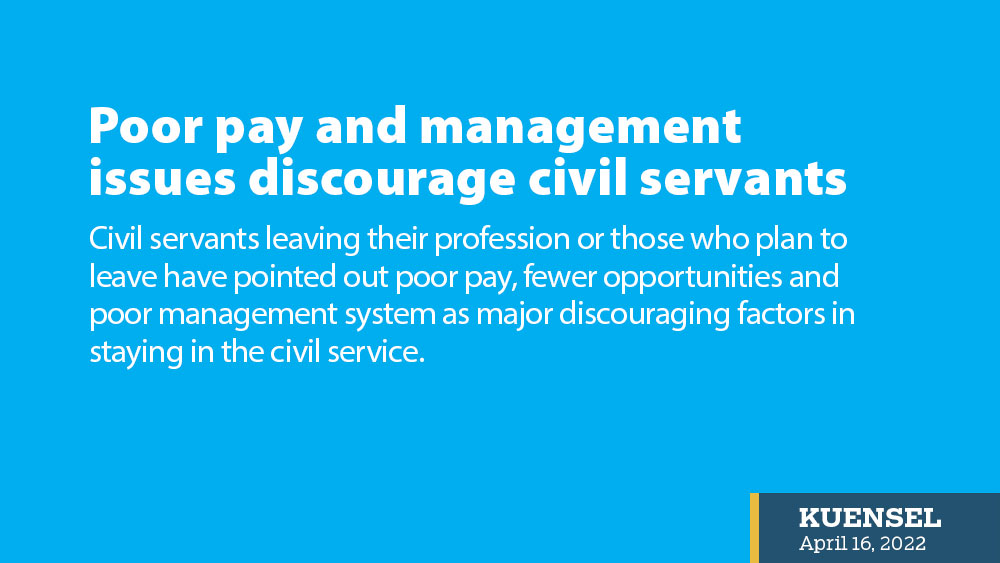Phurpa Lhamo
Civil servants leaving their profession or those who plan to leave have pointed out poor pay, fewer opportunities and poor management system as major discouraging factors in staying in the civil service.
A civil servant, who plans to leave the profession, said that less pay and mismatch between work and knowledge was the reason she chose to leave the profession.
She added that she planned to join corporations or private firms with higher pay scales or leave for other countries.
In April this year, about 2,000 people registered for International English Language Testing System (IELTS) at the Institute for Management Studies (IMS) in Thimphu.
Another civil servant, who has eight years of experience, said that his decision to leave civil service was due to heavy workload with fewer opportunities.
The civil servant pointed out that working sites, poor management system, and erratic changes in curriculums were some other challenges.
A civil servant in chief level said the recent leadership assessment also demotivated him. “I know few of the directors and dzongdags, who were dedicated civil servants,” he said. “When they are managed out without much say, I realised I have to look for other options too.”
Most of the young civil servants pointed out that pay was a major issue.
The Civil Service Statistics 2021 showed that about 75 percent of the civil servants were below 42 years as of December 31 last year.
As of December 31 last year, Bhutan had 31,177 civil servants of which 26,322 were regular civil servants.
In Bhutan, the ratio of civil servants to the population is 1:24.
According to the Royal Civil Service Commission (RCSC) annual report 2020-2021, the ratio of civil servants to the population in Bhutan is relatively higher when compared to other countries.
It stated that while there is no standard formula to determine the right ratio of civil servants to the population, the trend in some successful countries indicates that as the nation progresses, the number of civil servants gets smaller in terms of its ratio to the population.
Since 2021, the RCSC has been taking major steps toward civil service reform.
In March this year, 44 civil servants were managed out for failing the leadership assessment for the executives.
A civil servant said that the ‘managing out’ process was good as well as inappropriate within a short period.
Another added that while it’s a good decision to increase the competency of the individuals, the criteria and basis of managing our process should be disclosed to the public while retaining the names of the individuals.
“The recent quick changes in the civil service norms have created a shocking distress in the minds of the civil servants such that they stopped having the old connection they enjoyed for so many years,” a civil servant said.
The civil servant said that managing out should be in place to sieve out those underperforming civil servants regardless of their posts but just a written or viva voce wouldn’t be enough to assess the performance. “There are many other domains, which are more important than those tested domains.”
A research titled ‘What motivates young civil servants in Bhutan’ conducted by Royal Institute for Governance and Strategic Studies (RIGSS) with over 3,000 respondents showed that around 23 percent said that they weren’t motivated.
About 27 percent of the respondents rated their current motivation level at a 4, and only about 7 percent rated 5 out of 5.
Meanwhile, a senior civil servant said there are many underperforming civil servants and the commission is not managing them, but transferring them to dzongkhags and organisations.
“If RCSC is serious about reducing the number of civil servants, they should terminate those who are not performing,” she said. “The commission has lists of civil servants who are not performing, but cannot do anything than transferring them. It’s time they clean the system.”
Additional reporting
by Chhimi Dema


